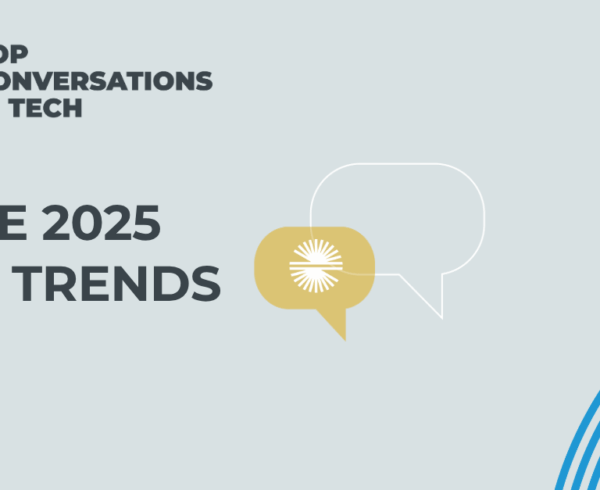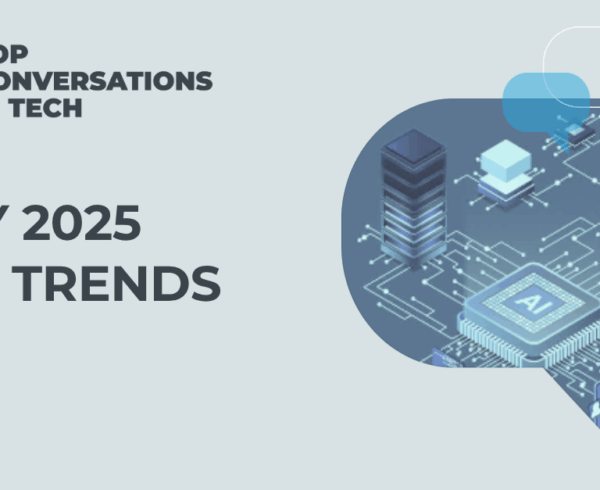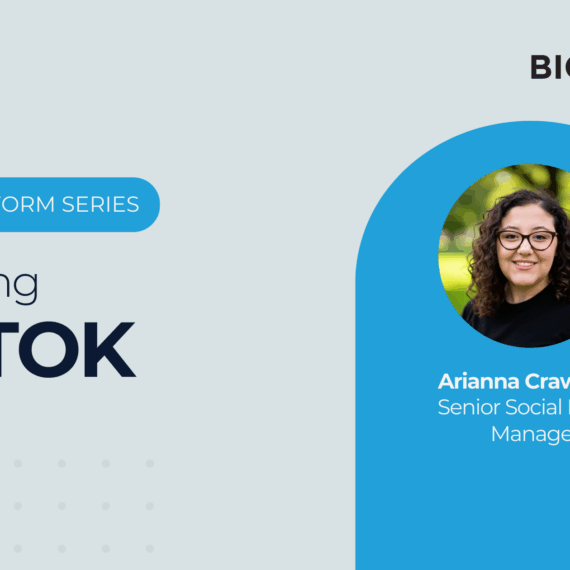It’s safe to say that conferences are back to total health as 40,000 healthcare IT professionals met at HIMSS 2023 to explore new trends, discuss challenges, and collaborate on solutions.
Hosted in Chicago this year, the Windy City provided a perfect backdrop for coming together post-pandemic to address many issues that still plague the healthcare system — aging populations, high costs, chronic disease, health access, data security, and patient choice — and how technology can help improve the efficiency of our healthcare system. But the biggest topic of the week by far was how artificial intelligence (AI) and Chat GPT will change the industry – although some warn about the unknown risks. 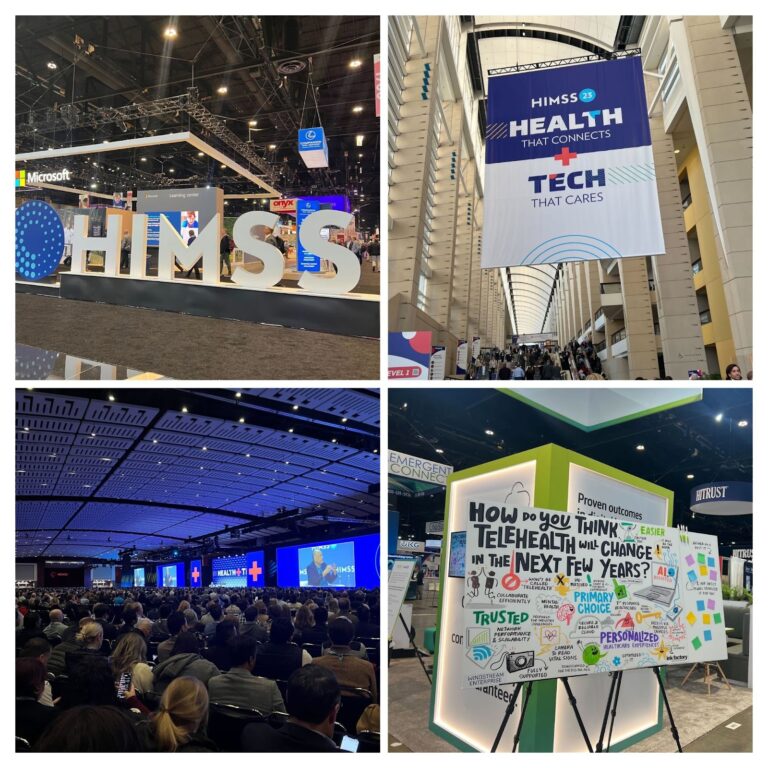
1. Artificial intelligence is here… but how do we use it?
HIMSS opened up the conference with a fascinating debate between several industry leaders about the responsibility and ethics of using artificial intelligence in a healthcare setting. Instead of debating actual use cases, it was a philosophical discussion about what Chat GPT actually is.
“Don’t be fooled by Chat GPT,” warned Reid Blackman, author and Chief Executive at Virtue. “It predicts the next set of words that it thinks is the next best. It’s a word predictor…not able to provide a diagnosis. What are we okay with?”
Chief Executive Officer for the Centre for Trustworthy Technology Kay Firth-Butterfield is one of the signers of the Pause Letter, which calls for leaders to work together to help regulate Chat GPT. “You shouldn’t engage without responsibility or thinking through the ethics of AI. What is it that we want these tools for our future? And we need to make it equitable.” Firth-Butterfield noted that 3 billion people still do not have access to the internet.
Microsoft’s Vice President of Research and Incubation Peter Lee and his team are dedicated to accelerating healthcare innovation through AI and cloud computing. Lee told the audience that “the healthcare community needs to assertively own” these tools, keeping in mind patient safety, efficacy and equity.
But there was also a call to action for healthcare IT. “Don’t wait to see what happens with the next interaction,” said Andrew Moore, founder and CEO of Lovelace AI. “Start right now, so you’ll be ready.”
So what are some of the key benefits and applications of AI in healthcare? Using AI in burdensome administrative tasks has the potential to make employees more efficient and allow them to focus on what they love to do — care for the patient. In turn, this could make the experience better for the patient.
Enterprise companies are already incorporating Chat GPT into their solutions. Both Epic and Salesforce announced Chat GPT integrations with their electronic health record (EHR) and customer relationship management (CRM) tools to help drive efficiencies within the workforce.
I reached out to Richard Simpson from Big Valley’s Research and Analytics team to understand the conversation happening in the market about AI in healthcare, and we see the volume has produced a hockey stick curve in the past two months. 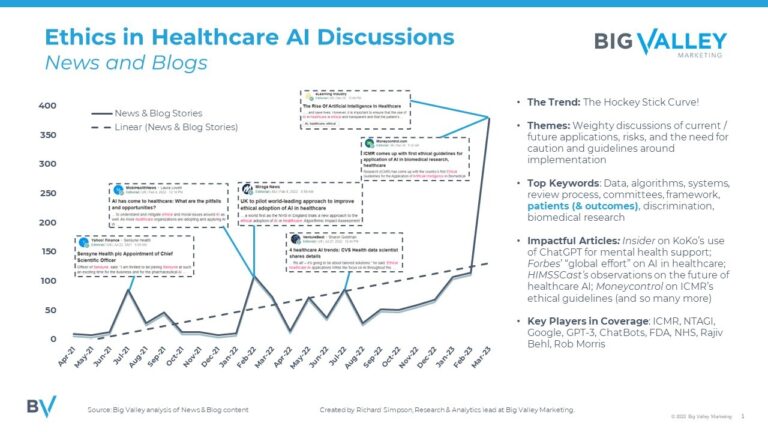
Take action: There’s a huge opportunity to develop a strong point of view in the market and be of service to your customers and drive awareness in your space. Work with your leadership and marketing team to develop a POV on how AI is impacting your vertical, and what your company is doing to contribute.
2. Shifting from patients to consumers
The healthcare system today is broken, said Glenn Tullman, CEO of Transcarent, a new type of health and care experience company.
“Half of our population is challenged in health, and getting high-quality healthcare. We have to do better,” Tullman shared. “We have to do something different.”
One of Tullman’s core predictions for the future of healthcare was shifting from a patient mindset to a health consumer mindset. “People aren’t defined by their illness and being called a “patient,” said Tullman. He further explained that instead of being called a diabetic, they are a person with diabetes. As a population, people want choice and want to be able to make their own decisions.
As an industry, healthcare needs to shift to empower consumers, instead of the patient being told what the treatment is, and not knowing the cost or the implications.
This also raises questions about the ethics of patient data. In today’s landscape, it’s impossible to access your own health data in one location. Implementing the patient-centric vision that the entire industry talks about means giving patients more access and control over their own data in a safe and secure way. This, in turn, leads to the importance of cybersecurity for healthcare…
Take action: For technology companies disrupting the traditional healthcare space – this is a big opportunity to create technology that puts the patient in the driver’s seat. We have apps for cars, takeout, and groceries – why not health care?
3. Healthcare cybersecurity deserves a seat at the table
Healthcare has undergone a serious digital transformation over the past several decades — but many are still at risk, for many reasons.
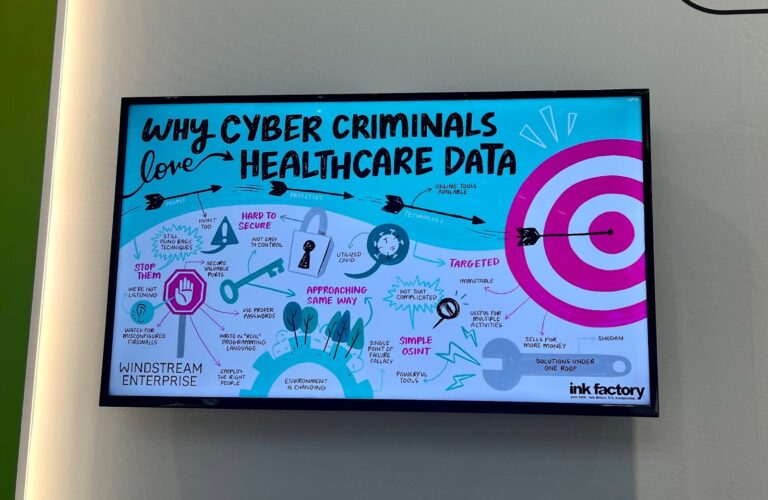 Where cybersecurity has been an afterthought or an addition to the adoption of digital technologies across the healthcare landscape, Sonnet Sapra, senior vice president and chief information officer at Samaritan Health Services, called for the CISOs to have a seat at the executive table to help design cybersecurity into healthcare from the beginning.
Where cybersecurity has been an afterthought or an addition to the adoption of digital technologies across the healthcare landscape, Sonnet Sapra, senior vice president and chief information officer at Samaritan Health Services, called for the CISOs to have a seat at the executive table to help design cybersecurity into healthcare from the beginning.
When the pandemic shut the world down, many organizations were forced to quickly adopt technology to ensure business continuity – technology that is at risk of cyber attack. Sapra shared how his organization conducts a mock cyber attack each year in order to educate and prepare the organization.
“Healthcare is the #1 industry targeted by ransomware attacks and other data breaches,” said Joshua Swarz, cybersecurity media expert here at Big Valley. “The combination of antiquated systems and the richness of confidential patient data makes the industry a gold mine for hackers.”
Take action: If you’re a cybersecurity company, you most likely are heading to the RSA conference next week. Stay tuned for more cybersecurity content from our team. In the meantime, be sure to understand the unique challenges that healthcare is facing due to increased data volume, systems, and stakeholders. How could you help your customer’s CISO protect the integrity of their systems?
HIMSS tackled many other challenges including health equity and the role technology plays, interoperability, and how the pandemic has fundamentally changed how healthcare is delivered. More for another day.
The bottom line is that healthcare is changing fast – and it leaves me wondering, what will next year look like? All I know is…next time I’m at the doctor, I’ll be asking if they are using Chat GPT.
If you were at HIMSS and you’re interested in a data-driven approach to your communications, developing a strong POV in the market and connecting with your target audience, let’s talk about your goals. Reach out for a complimentary brainstorming session at mjohnson@bigvalley.co or drop me a line about your takeaways from HIMSS.




